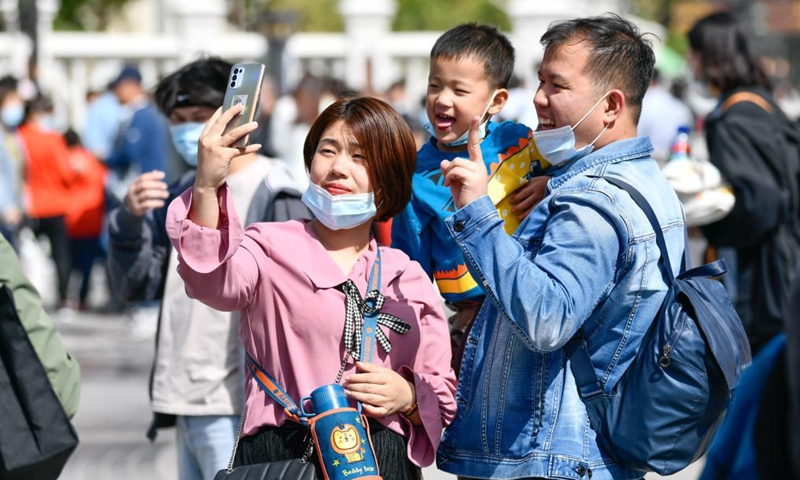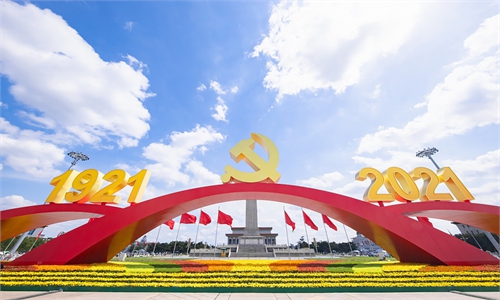Unreasonable, arbitrary to ask ‘why Chinese migrate to US, not the other way around’

Photo:Xinhua
China's implementation of the whole-process people's democracy must promote the wellbeing of the broad masses. This is the fundamental meaning of people being masters of the country. How has China been doing on this?
Some say that China is certainly not as good as the US in this regard. Otherwise, why would many Chinese migrate to the US and not the other way around? It seems this argument really makes sense. But in fact, it is unreasonable and arbitrary.
After the reform and opening-up, China's starting point was not on the same level with the developed US. Immigrants will always flow from poor areas to those with higher living standards. Over the past two years, the COVID-19 epidemic has been raging in the US and events of social instability such as ethnic clashes and mass shootings have all been at their peaks. The US' attractiveness to Chinese people has seriously declined. The US' political system has not changed but life there is in chaos. Ordinary Chinese do not even want to travel to the US, not to mention immigrating. Only a few overseas students still go to the US to complete their studies.
The most prominent dissatisfaction of some Chinese people is that the society is not fair. Today, I will focus on my understanding of this issue.
Unfairness is a common fact in human society. No matter what society, there are poor and rich. Although society may encourage fair competition, its result is still unfair.
For example, during the initial stage after the founding of the People's Republic of China (PRC) in 1949, the society was very poor and paid much attention to social fairness. However, to develop industries and cities and cultivate competitiveness, there were policy preferences. This led to the three major social differences that were often brought up in previous years: the differences between urban and rural, worker and peasant, and intellectual and manual workers. Those differences can still be seen today. For instance, the hukou, or household registration, provides access to special welfare in big cities.
When comparing the level of comprehensive governance between China and other countries, there are still many fields where we are inferior to the US and the West. However, most of them are the result of the long history before the founding of the PRC.
Whether the system led by the Communist Party of China (CPC) is a success is relative to the progress achieved by other countries in the same period. China's economic progress is universally recognized. What I want to discuss is whether the promotion of social fairness has achieved results that correspond to economic achievements.
The three major social differences mentioned above were formed during the initial stage after the founding of the PRC. After unremitting adjustments these years, have those gaps narrowed?
There are still differences between urban and rural areas. But the rural population has been drastically reduced and urbanization and new rural construction projects are advancing. This problem is not as absolute and prominent as in the past. The differences between worker and peasant have also become blurred during the process. When it comes to manual laborers, some of them have enjoyed the fastest income increase in recent years, like housekeeping and hospital care workers.
What I want to say is that China is working hard to build social equity. I have been to the US, Brazil and India. These are three large countries with different levels of development. Among Western developed countries, the US is relatively efficient but also has the largest gap between the rich and the poor. The US has made no progress in solving social unfairness over the years but instead it has even regressed. Brazil's per capita GDP is still slightly higher than that of China now. But if people visit the slums around Rio, Brazil's most prosperous city, it would be much too obvious how the gap between rich and poor has almost become "reasonable" in the country. Needless to say, that India is definitely one of the countries with the largest gap between rich and poor worldwide. Such a gap is not only "reasonable," but almost "justified" in India.
The Chinese government is not omnipotent. Our social justice still needs to continue to exert efforts in the dynamic. There are still problems that are not completely resolved in China and there are new manifestations of unfairness. For example, the income gap in big cities has increased, the conditions have become harder for new immigrants, and the uneven distribution of education resources has had a larger impact on competition. What is important is that there is a gap between the state of our fairness construction and the ideals of our socialist country.
I believe people have the right to express their dissatisfaction and continue to build pressure through public opinion. But meanwhile, our whole society needs to establish a sober collective understanding that the CPC-led government has done its utmost to achieve social justice and has accomplished the greatest progress of this era.
No society will be satisfied with its current achievements but we must understand the rules of social progress and know China's real position on the map of human progress. This is an era of fierce competition between various public opinions and there are internal and external forces that want to affect our values and recognition. We must not be confused. We must be able to tell who is conscientiously promoting our wellbeing and who is trying to form a conceptual maze that confuses the public.
The author is editor-in-chief of the Global Times. opinion@globaltimes.com.cn

Photo:Xinhua
China's implementation of the whole-process people's democracy must promote the wellbeing of the broad masses. This is the fundamental meaning of people being masters of the country. How has China been doing on this?
Some say that China is certainly not as good as the US in this regard. Otherwise, why would many Chinese migrate to the US and not the other way around? It seems this argument really makes sense. But in fact, it is unreasonable and arbitrary.
After the reform and opening-up, China's starting point was not on the same level with the developed US. Immigrants will always flow from poor areas to those with higher living standards. Over the past two years, the COVID-19 epidemic has been raging in the US and events of social instability such as ethnic clashes and mass shootings have all been at their peaks. The US' attractiveness to Chinese people has seriously declined. The US' political system has not changed but life there is in chaos. Ordinary Chinese do not even want to travel to the US, not to mention immigrating. Only a few overseas students still go to the US to complete their studies.
The most prominent dissatisfaction of some Chinese people is that the society is not fair. Today, I will focus on my understanding of this issue.
Unfairness is a common fact in human society. No matter what society, there are poor and rich. Although society may encourage fair competition, its result is still unfair.
For example, during the initial stage after the founding of the People's Republic of China (PRC) in 1949, the society was very poor and paid much attention to social fairness. However, to develop industries and cities and cultivate competitiveness, there were policy preferences. This led to the three major social differences that were often brought up in previous years: the differences between urban and rural, worker and peasant, and intellectual and manual workers. Those differences can still be seen today. For instance, the hukou, or household registration, provides access to special welfare in big cities.
When comparing the level of comprehensive governance between China and other countries, there are still many fields where we are inferior to the US and the West. However, most of them are the result of the long history before the founding of the PRC.
Whether the system led by the Communist Party of China (CPC) is a success is relative to the progress achieved by other countries in the same period. China's economic progress is universally recognized. What I want to discuss is whether the promotion of social fairness has achieved results that correspond to economic achievements.
The three major social differences mentioned above were formed during the initial stage after the founding of the PRC. After unremitting adjustments these years, have those gaps narrowed?
There are still differences between urban and rural areas. But the rural population has been drastically reduced and urbanization and new rural construction projects are advancing. This problem is not as absolute and prominent as in the past. The differences between worker and peasant have also become blurred during the process. When it comes to manual laborers, some of them have enjoyed the fastest income increase in recent years, like housekeeping and hospital care workers.
What I want to say is that China is working hard to build social equity. I have been to the US, Brazil and India. These are three large countries with different levels of development. Among Western developed countries, the US is relatively efficient but also has the largest gap between the rich and the poor. The US has made no progress in solving social unfairness over the years but instead it has even regressed. Brazil's per capita GDP is still slightly higher than that of China now. But if people visit the slums around Rio, Brazil's most prosperous city, it would be much too obvious how the gap between rich and poor has almost become "reasonable" in the country. Needless to say, that India is definitely one of the countries with the largest gap between rich and poor worldwide. Such a gap is not only "reasonable," but almost "justified" in India.
The Chinese government is not omnipotent. Our social justice still needs to continue to exert efforts in the dynamic. There are still problems that are not completely resolved in China and there are new manifestations of unfairness. For example, the income gap in big cities has increased, the conditions have become harder for new immigrants, and the uneven distribution of education resources has had a larger impact on competition. What is important is that there is a gap between the state of our fairness construction and the ideals of our socialist country.
I believe people have the right to express their dissatisfaction and continue to build pressure through public opinion. But meanwhile, our whole society needs to establish a sober collective understanding that the CPC-led government has done its utmost to achieve social justice and has accomplished the greatest progress of this era.
No society will be satisfied with its current achievements but we must understand the rules of social progress and know China's real position on the map of human progress. This is an era of fierce competition between various public opinions and there are internal and external forces that want to affect our values and recognition. We must not be confused. We must be able to tell who is conscientiously promoting our wellbeing and who is trying to form a conceptual maze that confuses the public.
The author is editor-in-chief of the Global Times. opinion@globaltimes.com.cn


